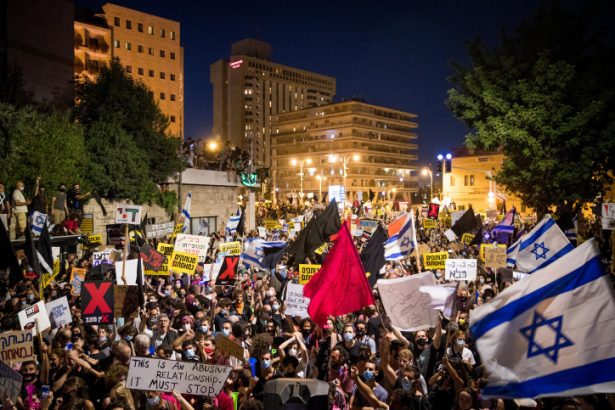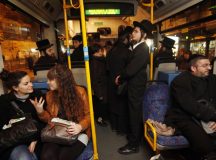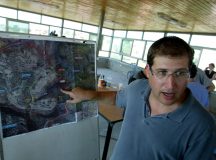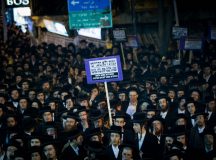Fathom is introducing a new kind of voice to our readers. From time to time we will publish a diary from a writer in Israel, mixing on-the-ground observations of life with political analysis. Calev Ben-Dor starts off our new series with an urgent reflection on the rising tide of anger in Israel.
When I say Israel’s second lockdown has been tough for us with two small children, I don’t mean to imply it hasn’t been a nightmare for others. But this is a diary, so here we go.
It’s been difficult to work, and even harder to read. But with a headphone in one ear while doing a Disney puzzle with our 3 year old, or trying to soothe our newborn to sleep, I did manage to listen to Tim Ferris’ podcast with former Chief Rabbi Jonathan Sacks. Yet what I heard prompted some troubling thoughts.
Sacks was discussing his book, Morality: Restoring the Common Good in Divided Times (which I had managed to read in pre-Corona times). The book models two types of societies – the ‘we society’ and the ‘I society’. Our modern focus is on individualism, to the detriment of collective responsibility. Yes, it’s liberating, but it also causes problems: ‘Whenever I takes over from a place that should be about we, you get catastrophe’ he told Ferris.
‘Two of the countries that have done worst in the world in dealing with COVID-19,’ Sacks went on, ‘have been the two most individualistic societies in the world today, the United States and the United Kingdom.’ Why? Because ‘they have too much I and too little we.’ Countries that maintain the balance, such as South Korea, Taiwan, Singapore, New Zealand and Germany have coped much better.
So where would Israel fit on the I-We society spectrum?
The good news is that Israel does have lots of the components of a ‘we society’. It pulls together when faced with external threats. Most citizens would go out of their way to help a stranger in need. Hitchhiking isn’t considered insanely dangerous. There is an overarching story that binds many of us.
The bad news is that the state is comprised of several we’s.
In a 2015 speech, President Rivlin warned that demographic processes were creating a ‘new Israeli order’ comprised of four tribes – secular Zionists, national-religious, Israeli-Arabs, and ultra-Orthodox Haredim. The overlap between them is often minimal. Each has its own media platforms, newspapers and television channels. The difficulty of creating a shared vision and flourishing society is accentuated by the fact only two of the four generally serve in the army; only two of the four maximise their economic potential; and only two of the four are even Zionist.
Perhaps most significantly – and worryingly – each tribe believes its values and lifestyle is under threat from the others. And they fear that if they don’t battle to protect their way of life, it will be lost.
And Covid has further eroded an already fraying social solidarity, I had read about social solidarity in a paper by the Institute for National Security Studies (INSS), one of Israel’s leading think tanks. ‘The Coronavirus Crisis and the Opportunity for Social Transformation’ tells us that our ability (and will) to demonstrate mutual responsibility even with other social groups with which we have deep disagreement is vital to the health of a society, but is on the slide in Israel (and elsewhere).
The INSS argue that Israel’s ‘tribal’ struggle ‘has evolved from a legitimate ideological-political-partisan controversy between competing standpoints, to a bitter struggle between sectors and tribes over resources and influence.’
Thinking about these last weeks, I could see what they meant.
Depressingly, each ’tribe’ looks at the Corona infractions (or perceived infractions) of the others to justify its own behaviour, whether these be the mass prayers, studies, and funerals amongst the ultra-Orthodox, the mass weddings in the Arab community, or the open bars and mass anti-Netanyahu protestors of the secular. Put these mass gatherings together and you can see why little progress is being made on breaking the virus’ chain of infection.
The government has directed its ire on the demonstrations, Netanyahu and family terming them ‘anarchists’ and ‘aliens’ (full disclosure: I’ve been twice and the vast majority are neither). Yet anarchy might not be the most inappropriate word to describe some of the decision-making inside the Prime Minister’s Office. Prioritising politics over policy, the opinion of professional civil servants has consistently been ignored. A Coronavirus commissioner, Ronnie Gamzu, was appointed late, given too little authority, and subsequently sidelined when expedient.
The Conservative American political commentator Ben Shapiro likes to remind people – especially liberals – that ‘facts don’t care about your feelings’. But in Israeli politics, the facts (Corona is mainly spread indoors, when people get close to each other in confined and poorly ventilated spaces; masks are essential etc) are being trumped by the feelings of key conservative constituencies.
To maintain the support of the ultra-Orthodox parties – a central component to the Prime Minister’s coalition – a partial lockdown of red localities, areas with high levels of Corona, suggested by Gamzu was rejected. Prayer services (generally held inside and mask-less) could apparently not be stopped as long as (outside and masked) demonstrations continued. The infection rate of this tribe is five times higher than the general population – 45 per cent of all reported cases despite comprising only 12 per cent of the population.
Cabinet decisions are changed every few days. We could move 500 metres from home, then 1 kilometre. Then the cabinet sought to reduce it to 200 metres. A few days before the Jewish New Year we still didn’t know what we could and couldn’t do. The airport was closed – for no reason other than for the sake of equality (as not all citizens could afford to fly).
Reports claim the Prime Minister only promoted a full nationwide lockdown when told it was the sole way to prevent demonstrations. Gamzu described the cabinet discussion as ‘nauseating’.
And while children haven’t hugged their grandparents for months, a list of Israeli political leaders – including the Prime Minister, President, and Shin Bet head – have been caught breaking lockdown. Whenever I think I can no longer be shocked by the behaviour of some of our elected officials, I get an ugly reminder of my failure of imagination. I discover a deputy minister has joined hundreds at a wedding, only to find out that the then-health minister Yaakov Litzman had prayed in a quorum during lockdown when it was banned. But the ‘one rule for them, one for me’ award should surely go to Environmental Protection Minister Gila Gamliel who travelled over 150 kilometres to violate lockdown in order pray in her father in-law’s synagogue in Tiberias over Yom Kippur. Not only did she contract COVID, but then allegedly falsely claimed she was infected by her driver, and avoided attempts made by health officials to carry out contact tracing.
Of course no one resigns. Principle and / or embarrassment have almost disappeared from Knesset life. MKs are threatened with the sack for questioning the cabinet’s COVID proclamations but not for breaking them. Ministers who openly flout restrictions call on the Commissioner who suggested them to be fired.
Is it any surprise the public trust in government is eroding? Surveys show only 27 per cent of respondents trust the Prime Minister to lead the effort against the coronavirus (compared to 57.5 per cent on April 1). Frankly, I’m surprised it’s as high as 1 in 4 people. Perhaps – Corona restrictions aside – I need to expand my social circle.
The upshot of the tribalism, the politics, and the rule-breaking by those at the top is that the public are beginning to simply ignore the (ever-changing) restrictions. And so, post lockdown, the police have scuffled with at-least two of the tribes – the secular and the ultra-Orthodox – in Jerusalem, Tel Aviv, Bet Shemesh and Beitar Illit. I worry things may yet escalate.
At the same time, many – I’d say the vast majority of – people are keeping the rules. Since March, I don’t remember seeing anyone inside stores without a mask. Yesterday I passed a bakery store with people lined up outside waiting patiently for entry. (‘Patiently’ is an adverb not always used to describe how we Israelis wait in line. Even ‘waiting in line’ is a new concept)
Anti-government protests have mainly morphed into gatherings at hundreds of small locations on main roads, city squares, and intersections around the country, each within 1 kilometre of the attendees’ home. Every day, on my short walk to the promenade, I pass a 70 year-old couple standing at a roundabout with black flags.
Listening to Sacks while watching my daughter lost in her Disney fantasies, I worried about her future.
I thought about New York Times columnist David Brooks’s recent warning that when a fractured society whose constituent parts feel threatened by each other faces a global health crisis and government dysfunction, there is no guarantee it will recover. As the society’s stock of social trust – the capacity to see people and institutions in society as trustworthy, as likely to keep their promises and work for the common good – runs down it may be that ‘the nation collapses.’
It would be wrong to directly compare Israel’s situation to the subject of Brooks’s fear, his own roiling US. They’re in a much darker place than we are. To paraphrase Tolstoy, let’s just say all unhappy countries are unhappy – and dysfunctional – in their own ways.
Our institutional decay and our implosion of social trust is only partly due to Corona. The constitutional crisis created by a Prime Minister under indictment for serious corruption charges who refuses to stand down plays its part. As does the long-standing delegitimization of the courts, the justice system, and the attorney general, in the shadow of that trial. The police – already distrusted by many Arabs, ultra-Orthodox, settlers, Ethiopians and others – is now gaining a reputation for brutality amongst the secular Zionist centre-left as well. When a fractured society preoccupied with economic hardships distrusts the government, the police and the courts, where is there for us to turn?
I worry that something is breaking in Israel. But we are not helpless. We can work to restore the ‘we’ and the common good in divided times. We have to try and put the pieces of the puzzle back together again.





































An excellent piece which echoes many of my own thoughts (and so many others!). I only wish there were some concrete ideas for how to ‘restore the ‘we’ and the common good in divided times.’